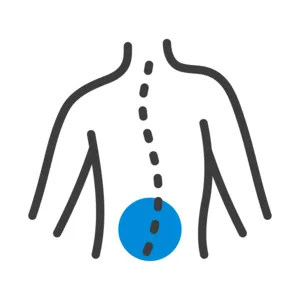Visit our Location
8241 Fredericksburg Road
San Antonio, TX 78229
Give us a Call
Office Hours
Mon - Wed: 9:30AM-12:30PM & 3PM-6PM
Thu: 9:30AM-11:30AM | Sat: 9:30AM-12:30PM
Introducing Vanguard Chiropractic located in San Antonio, TX.
Back Pain Relief, Neck Pain Relief, and More
Vanguard Chiropractic is focused on your health and wellness needs through preventative chiropractic, acupuncture, and integrated health. Dr. Daniel Murray, DC offers gentle, effective chiropractic care to help you relieve pain and improve your overall health.
Our Services
We are proud to offer a wide range of comprehensive services to meet the needs of adults, seniors, and pediatric patients. Our team of professionals specialize in providing personalized chiropractic, rehabilitative therapy, and wellness care.

Chiropractic Adjustments

Wellness Care
Symptoms & Conditions
This is just a partial list of the symptoms and conditions we can address at Vanguard Chiropractic. Our dedicated team will conduct a thorough evaluation, including a detailed medical history and examination, to provide you with personalized treatment plans tailored to your specific needs.
Neck Pain | Back Pain | Sciatica & Neuropathy| Headaches & Migraines | Joint Pain & Arthritis | Sports Injuries | Children's Chiropractic | Wellness & Preventative Care | Pregnancy | Repetitive Strain Injuries | Work Injuries | Auto Accident Injuries | Stress | and more …
San Antonio Chiropractor near me
Our office is conveniently located at the Seville Office Park in San Antonio, TX.

Our Approach
Personalized Treatment
You will receive a full individualized treatment
Licensed Providers
Your treatment will be performed by only licensed providers
Experienced Staff
Our staff is trained and here to serve your needs
Service Minded Clinic
Our clinic takes a no problem approach to your care. We are here to help you.
Practitioners Network
We will work closely with all your health practitioners
Therapy Goals
Setting goals is the best way to enjoy a successful outcome
Frequently Asked Questions
I've never been to your office or a Chiropractor before. What will happen on my first visit?
During your first visit to the chiropractor, you will have a private conversation with the doctor to discuss your health concerns, go over your intake paperwork, and talk about why you are there. After that, the doctor will perform a thorough exam of your nervous system and musculoskeletal system to evaluate your overall health and the condition of your spine.
Depending on your case, the doctor may recommend taking X-rays of your spine to gain a better understanding of its structure and health. X-rays help the doctor see the position of your spinal bones, the quality of your spine, and whether it is safe to perform any adjustments. X-rays can also help the doctor determine how long your spinal condition has been developing.
If necessary, the doctor may also perform a relief treatment during your first visit. This will be at the discretion of the doctor and based on your specific needs.

Will I receive a plan of care, see the results of any tests that were performed, and be able to ask questions?
During your report of findings visit, the chiropractor will review your test results and diagnostic imaging (if applicable) to determine the cause of your problem. They will explain to you what is wrong with your spine or other areas of your body and how it affects your overall health and well-being.
Based on this information, the chiropractor will develop a treatment plan specifically tailored to your needs. This plan may include chiropractic adjustments, exercises, stretches, and other therapies to help alleviate your symptoms and improve your overall health.
The chiropractor will also discuss with you how long it may take to see results and how many treatments you may need to fully resolve your problem. They will also explain the cost of each treatment and what your insurance may cover.
Throughout the visit, the chiropractor will encourage you to ask any questions you may have so that you fully understand your condition and treatment plan. They may also offer advice on how to maintain good spinal health and prevent future problems.
Overall, the report of findings visit is an important step in your journey towards optimal health and well-being. By working closely with your chiropractor and following their treatment plan, you can achieve lasting pain relief and improved overall health.

What can I expect during my scheduled office visits?
When you come in for your regular visits to a chiropractor who does spinal adjustments, you can expect a few things.
First, your chiropractor will likely ask you about any changes in your health since your last visit. They may ask about any pain or discomfort you're experiencing, as well as any other symptoms you've noticed. This will help them determine how to best approach your treatment.
Next, your chiropractor will examine your spine and any affected areas of your body. They may use their hands or specialized tools to gently manipulate your spine or joints in order to relieve tension and improve mobility. This is known as a spinal adjustment.
Depending on your treatment plan, your chiropractor may also use other therapies to complement your adjustments. This may include acupuncture, massage, or other forms of physical therapy. Your chiropractor will work with you to determine which therapies will be most effective for your specific needs.
At our office, we value your time and strive to run our practice efficiently. We understand that your time is important, and we work hard to ensure that your appointments are as productive and effective as possible. Our goal is to help you achieve positive results, whether you're looking to relieve pain, improve mobility, or simply maintain your overall health and wellness.
We hope that this gives you a better understanding of what to expect during your visits to a chiropractor. If you have any questions or concerns, please don't hesitate to ask. We're here to help you achieve optimal health and wellness, and we look forward to working with you!

What types of insurance does your office accept?
Our chiropractic office accepts a variety of insurance plans, including but not limited to, private health insurance, worker's compensation, Medicare, Medicaid, and auto insurance for car accident cases. Please contact us to verify if we accept your specific insurance plan.

Do you accept cash or offer self-pay options at your chiropractic office?
Yes, we do accept cash payments and offer self-pay options for patients who do not have insurance or choose not to use their insurance benefits. We understand that not everyone has insurance coverage, and we want to ensure that all patients have access to high-quality chiropractic care.

Do you offer any discounts for self-pay patients?
Yes, we offer various discounts and payment plans for self-pay patients to help make chiropractic care more affordable. We believe that everyone deserves access to healthcare, regardless of their financial situation, and we are committed to providing our patients with the care they need at a reasonable price. Please contact our office for more information on our self-pay discounts and payment options.

Articles
Here are just a few of the available articles in our Blog:
- How Chiropractic Care Can Help Alleviate Low Back Pain
- Relieving Headaches Naturally: How Chiropractic Care Can Help
Other Topics include:
Neck Pain | Low Back Pain | Sciatica | Headaches | Chiropractic Adjustments | Symptoms | and more …
Vanguard Chiropractic focuses on prevention and recovery, alongside general wellness. Through acupuncture, chiropractic, stretching, strengthening, and balancing, our goal is to ensure you are staying healthy and active while achieving your wellness & fitness goals.
Meet Dr. Daniel Murray, DC

Dr. Daniel Murray, DC
Chiropractor
Introducing Dr. Daniel Murray, DC, an exceptional chiropractor in San Antonio! With a passion for family care and a specialization in vertebral subluxation correction, Dr. Murray is dedicated to optimizing your well-being. Experience his expert adjustments, trusted by professional athletes and patients of all ages. Discover his valuable insights in his book, "Keeping Health Simple." Join Dr. Murray at Vanguard Chiropractic and embark on a journey towards a healthier, happier you!
See What Our Patients Have to Say
Chiropractic Care and Insurance Options in San Antonio
Our practice at Vanguard Chiropractic is dedicated to providing comprehensive care to our patients. We're pleased to accept a variety of insurance plans, ensuring accessibility for your chiropractic needs. Additionally, we offer flexible options for cash-paying patients, along with affordable plans to suit different preferences. Get in touch with us today to explore your options and verify your benefits!




Visit our Location
8241 Fredericksburg Road
San Antonio, TX 78229
Give us a Call
Resources

Office Hours
Monday: 9:30AM - 12:30PM & 3PM - 6PM
Tuesday: 9:30AM - 12:30PM & 3PM - 6PM
Wednesday: 9:30AM - 12:30PM & 3PM - 6PM
Thursday: 9:30AM - 11:30AM
Saturday: 9:30AM - 12:30PM
Friday & Sunday: CLOSED
© Copyright 2023 Veloce Solutions LLC | All Rights Reserved
Schedule your next

